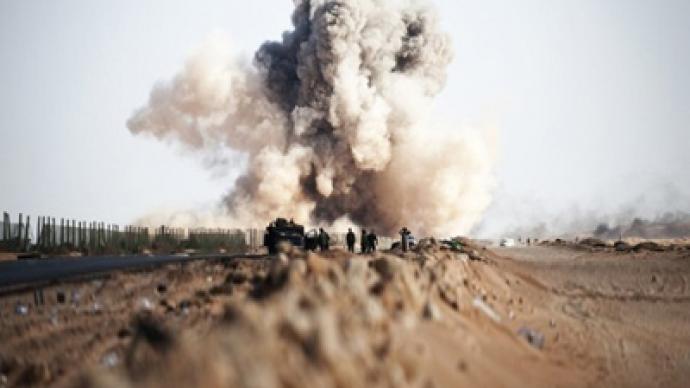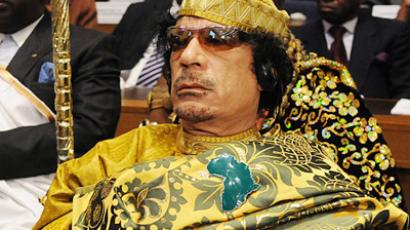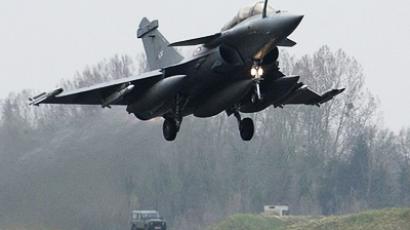Is Washington more obsessed with Iran rising than Libyans dying?

According to US media sources, American military observers are concerned that Iran is being strengthened by the anti-government protests rocking the Middle East and Arab.
The Wall Street Journal, a conservative US business daily, reported on Wednesday that President Barack Obama's decision last week to implement military force against Libyan leader Muammar Gaddafi's regime was made in part by his administration's “fear that Western inaction could further embolden Tehran.” The article ("U.S. Reacts to Fear of Iran's Rising Clout"), which quotes anonymous US, European, and Arab sources, sheds light on the more realistic behind-the-scenes reasons for the United States, together with a mishmash of western states, including the UK and France, jumping headlong into the Libyan fray.The lightning invasion of Libya by the Western coalition, harshly condemned by Russia as “indiscriminate bombing,” is not simply a defense of Libyan civilians, according to US sources, but a move on the geopolitical chessboard to counter Iranian influence, as well as protect precious oil routes.Incredibly, a total of 13 North African and Middle East nations have experienced various degrees of upheaval since the first disturbance was reported in Tunisia in December (a young man set himself ablaze after police confiscated the fruits and vegetables he was selling without a permit). Since then, the region has experienced the full spectrum of unrest, from relatively minor social protests (Algeria and Saudi Arabia), to full-blown major disturbances (Egypt, Tunisia and Bahrain). To date, two governments have fallen victim in the wake of the disturbances, while the government of Libyan leader Muammar Gaddafi seems to be hanging by a proverbial thread. This towering wave of social unrest will have repercussions in the region that are presently impossible to predict. But one immediate fear is that the Islamic Republic of Iran will win greater influence at the expense of Saudi Arabia, its Arab contender. This could have dramatic consequences for the region, not to mention US influence.Everything becomes more clear when it is realized that Sunni-majority Saudi Arabia and Shiite-majority Iran “are locked in a battle for regional influence,” as the article explains. This power struggle between the two biggest regional players – Israel and the United States not included – places special significance on the Middle East uprisings.For example, the Sunni monarchy in Bahrain, which is “home to US naval operations that help control the Persian Gulf's oil flow,” is now in a bitter standoff against predominantly Shiite anti-government protesters. A collapse of the monarchy could usher in a Shiite-led government that has no interest in being America’s partner.Things have deteriorated to such a degree that a Saudi-led military force is now in Bahrain aiding the Western-backed monarchy, which seems like pure hypocrisy to many people in the Middle East, and not least of all the Iranians.“The Obama administration's military maneuvers against the Libyan government prove the high level of hypocrisy,” Iran’s Press TV commented after the commencement of military activities in Libya. The report sited Washington’s meek rebuke of the Bahrain government's crackdown on the largely Shiite protest movement."I put the question to some in the Arab and Islamic worlds: Why have you remained mum over the tyranny against our people in Bahrain," Hassan Nasrallah, the head of Lebanon's Hezbollah party and a close Iran ally, said on Saturday. "Is it only because they are Shiites?"Then there is Yemen, one of Washington's closest Arab allies, where the government of President Ali Abdullah Saleh is teetering on the brink of collapse. Such an event could also strengthen Iran in the region. "Everything the US is doing to respond in the Middle East is colored by how this could hurt or help Iran," said a European official, as quoted by the US newspaper. "This might be an overreaction, but it's how people are viewing things." Iranian President Mahmoud Ahmadinejad has attempted to portray the Middle East's revolutionary wave as inherently anti-American. Yet Tehran understands that it is walking on shaky ground since it just passed through its own protests in 2009 following allegations that national elections had been rigged. The Obama administration attempted to show that Tehran, which is enduring heavy sanctions by the international community for not cooperating with inspections of its nuclear sites, itself was hypocritical: advocating protests in Arab nations, while suppressing them at home.Over the weekend, the American president accused the Iranian government of “fear.” "So far, the Iranian government has responded by demonstrating that it cares more about preserving its own power than respecting the rights of the Iranian people," Obama said in a video message. "These choices do not demonstrate strength, they show fear."Finally, there is Syria, which has also witnessed political unrest in recent days. “US officials…are now closely tracking a growing protest movement that has focused on the southern Syrian city of Deraa, which is now viewed as the greatest political challenge to [Syrian President Bashar al-Assad’s] 11-year rule,” The Wall Street Journal article reported. “…And U.S. officials, while cautious in predicting Mr. Assad will fall, believe the protests could force the 46-year-old leader to limit his cooperation with Tehran.”"We do expect Iran will attempt to take advantage of events for its own purposes," Ben Rhodes, U.S. deputy national-security adviser for strategic communications, told the US paper. "Iran has a long history of attempting to meddle in the affairs of other countries."Robert Bridge, RT














